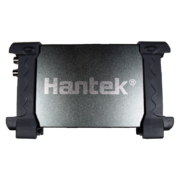Difference between revisions of "Hantek 6022BE"
Uwe Hermann (talk | contribs) |
Uwe Hermann (talk | contribs) |
||
| Line 89: | Line 89: | ||
}} | }} | ||
</small> | </small> | ||
'''Analog Devices ADS9288 pinout''': | |||
{| border="0" style="font-size: smaller" class="alternategrey sortable sigroktable" | |||
|- | |||
!AD9288 pins | |||
!Description | |||
|- | |||
| S1, S2 | |||
| S1=VCC, S2=GND. "Normal operation, data align disabled". | |||
|- | |||
| DFS | |||
| Tied to GND. Data format select = "offset binary" (not "twos complement"). | |||
|- | |||
| A<sub>IN</sub>A, A<sub>IN</sub>B | |||
| Analog input channels. | |||
|} | |||
'''Cypress FX2 pinout''': | |||
{| border="0" style="font-size: smaller" class="alternategrey sortable sigroktable" | |||
|- | |||
!FX2 pins | |||
!Description | |||
|- | |||
| CTL2/IFCLK | |||
| Connected to AD9288 ENC<sub>A</sub> and ENC<sub>B</sub>. | |||
|- | |||
| PB0-PB7 | |||
| Connected to AD9288 D0<sub>A</sub>-D7<sub>A</sub>. | |||
|- | |||
| PD0-PD7 | |||
| Connected to AD9288 D0<sub>B</sub>-D7<sub>B</sub>. | |||
|- | |||
| PA7 | |||
| 1kHz probe calibration pin. | |||
|- | |||
| PC0/PC1 | |||
| Dual-color (red/green) LED.<br />PC0=1 + PC1=0: LED green.<br />PC0=0 + PC1=1: LED red.<br />PC0=1 + PC1=1: LED off. | |||
|} | |||
== Photos == | == Photos == | ||
Revision as of 23:31, 7 April 2017
 | |
| Status | supported |
|---|---|
| Source code | hantek-6xxx |
| Channels | 2 |
| Samplerate | 48MHz |
| Analog bandwidth | 20MHz |
| Vertical resolution | 8bit |
| Triggers | none (SW-only) |
| Input impedance | 1MΩ‖25pF |
| Memory | none |
| Display | none |
| Connectivity | USB |
| Website | hantek.com |
The Hantek 6022BE is a USB-based, 2-channel oscilloscope with an analog bandwidth of 20MS/s and 48MS/s sampling rate.
See Hantek 6022BE/Info for more details (such as lsusb -v output) about the device.
Hardware
- USB: Cypress CY7C68013A-100AXC (FX2LP) (datasheet)
- 256-byte I²C EEPROM: Microchip 24LC02BI (datasheet)
- 2x 8-channel analog multiplexer/demultiplexer: NXP 74HC4051D (datasheet)
- 1A low-dropout voltage regulator (3.3V): Advanced Monolithic Systems AMS1117-3.3 (datasheet)
- 2W, fixed input, isolated & unregulated dual/single output DC/DC converter: Mornsun A_S-2WR2 (A0505S-2WR2) (datasheet)
- 8-bit, 40/80/100MHz, dual ADC: Analog Devices AD9288 (datasheet)
- 4x 145 MHz FastFET Op Amp: Analog Devices AD8065 (datasheet)
- Crystal: 24MHz
NXP 74HC4051D (upper/lower, CH1/CH2) pinout:
|
|
Microchip 24LC02BI pinout:
| (Low, but not GND) A0 | 1- | O | -8 | VCC |
| (GND) A1 | 2- | -7 | WP (GND) | |
| (GND) A2 | 3- | -6 | SCL (FX2 SCL) | |
| VSS | 4- | -5 | SDA (FX2 SDA) |
Analog Devices ADS9288 pinout:
| AD9288 pins | Description |
|---|---|
| S1, S2 | S1=VCC, S2=GND. "Normal operation, data align disabled". |
| DFS | Tied to GND. Data format select = "offset binary" (not "twos complement"). |
| AINA, AINB | Analog input channels. |
Cypress FX2 pinout:
| FX2 pins | Description |
|---|---|
| CTL2/IFCLK | Connected to AD9288 ENCA and ENCB. |
| PB0-PB7 | Connected to AD9288 D0A-D7A. |
| PD0-PD7 | Connected to AD9288 D0B-D7B. |
| PA7 | 1kHz probe calibration pin. |
| PC0/PC1 | Dual-color (red/green) LED. PC0=1 + PC1=0: LED green. PC0=0 + PC1=1: LED red. PC0=1 + PC1=1: LED off. |
Photos
Another teardown:
Protocol
| Oscilloscope command | bRequest value | Notes |
|---|---|---|
| Set CH0 voltage range | 0xE0 | Possible values: 1,2,5,10 (5V, 2.5V, 1V, 500mV). |
| Set CH1 voltage range | 0xE1 | Possible values: 1,2,5,10 (5V, 2.5V, 1V, 500mV). |
| Set sampling rate | 0xE2 | Possible values: 48, 30, 24, 16, 8, 4, 1 (MHz) and 50,20,10 (*10kHz). |
| Trigger oscilloscope | 0xE3 | Possible values: 1 == start sampling. |
| Set number of channels | 0xE4 | Possible values: 1, 2. |
Firmware
In order to use this device, the sigrok-firmware-fx2lafw (>= 0.1.4) firmware is required.
The firmware was originally written by Jochen Hoenicke (see README for details), thanks a lot!
Note: The firmware is not flashed into the device permanently! You only need to make it available in the usual place where libsigrok looks for firmware files, it will be used automatically (and "uploaded" to the Cypress FX2's SRAM every time you attach the device to a USB port).



















